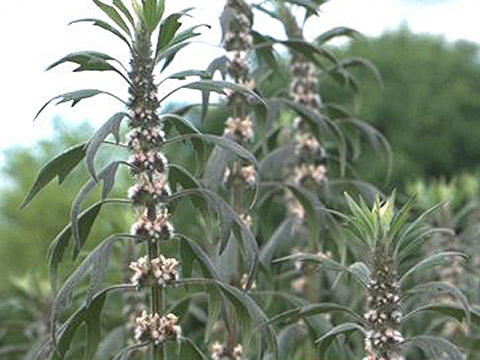Botanical name
Leonurus cardiaca L.
Family
Lamiaceae
Common name
Common motherwort, Throw-wort, Lion's tail
Information about the plant
Motherwort is found in Central Europe and Scandinavia, extending through Russia to Central Asia, and has been introduced to North America. The plant grows on rubble, along fences and hedges, and in similar undisturbed areas.
The genus name Leonurus is derived from the lat. 'leo' (= lion, genitive: leonis) and the Greek 'oura' (= tail), which alludes to the similarity of the spikelet with its numerous bright purple flowers to a lion's tail. The species epithet cardiaca, derived from the Greek 'cardia' (= heart), refers to the heart-healing effect of this plant. This is also conveyed by the German name “Herzgespann”, where “Gespann” is an old German word for “cramp”.
Motherwort grows to over 1 m in height, with a longitudinally grooved, shaggy-haired main axis. The leaves, which are 3 to 5 lobed (sometimes 7 lobes), are crossed and opposite. They are coarsely serrated, softly hairy underneath, and become progressively smaller toward the flowers. The flowers are borne in 10 to 15 many-flowered, almost spherical pseudo-whorls, one above the other, each supported by a leaf. The calyx has five thorny teeth, from which a pink or whitish labellum emerges, with a flat, helmet-shaped, hairy upper lip and a three-lobed lower lip. The fruits are small, tetrahedral nuts. The flowering time is from June to September.
Medicinally used parts of plants (herbal drug)
The above-ground parts of the plant (Leonuri cardiacae herba), collected at flowering time, are used. The drug consists of parts of the stem, leaves, and flowers; occasionally small fruits (botanically: nuts) are also found.
The commercially available drug is sourced from wild collections in Eastern Europe.
Constituents of the herbal drug
Motherwort contains diterpene bitter substances, iridoids, flavonoids, caffeic acid derivatives, and phenylethanoids.
Quality of the drug
The quality of Leonuri cardiacae herba is specified in the European Pharmacopoeia (Ph. Eur.).
Medical applications
Recognised medical use
The HMPC has classified motherwort as a traditional herbal medicinal product (see “Traditional use”).
ESCOP: mild cardiac complaints of nervous origin; this indication is based on findings on long-standing use.
Traditional use
Motherwort has been classified by the HMPC as a traditional herbal medicinal product (Article 16a of Directive 2001/83/EC). Based on upon long-standing use, motherwort can be used for nervous tension and nervous cardiac complaints, such as palpitations, after a serious illness has been excluded by a medical doctor.
Herbal drug preparations in finished dosage forms
- Cut motherwort for tea preparation
- Fluid extract in liquid preparations
- Tincture in drops
- Leonurus cardiaca homeopathic mother tincture in liquid preparations.
Dosage
Tea: drink a cup of motherwort tea 3 times a day. Daily dose: 3 to 10 g of the drug.
Preparation of a tea
Pour 150 mL of boiling water over 2 to 4 g of motherwort and strain after 10 minutes.
Notes
The use of motherwort during pregnancy is not recommended. No safety studies are available on the use of motherwort during lactation. The use of motherwort in children and adolescents under the age of 18 is not recommended due to a lack of evidence.
Side effects
None known.
Interactions
None known.
References
Herbal drug monographs
HMPC (2010, 2019), ESCOP (2019), WHO (NIS)
Further literature
Commentary on the European Pharmacopoeia (Motherwort, No. 1851)


